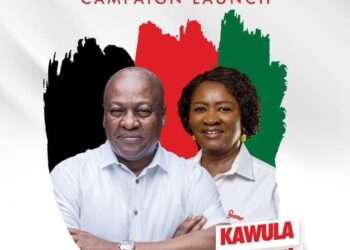Ghana is making significant strides in its digital transformational agenda. The Minister for Communications and Digitalisation (MoCD), Mrs. Ursula Owusu-Ekuful (MP), has highlighted the significant strides made by the Ministry of Communications and Digitalisation (MoCD) in Ghana since 2017.
These efforts were aimed at establishing robust digital infrastructure to bridge the digital divide across the country and beyond, in alignment with the Digital Ghana Agenda. The government’s commitment to digitalization as a cornerstone of economic development was emphasized, with a focus on innovative Information and Communication Technologies (ICT) solutions.
“As of February 2024, 1,010 of the planned sites have been successfully constructed, with 618 of them already operational, offering essential Voice and Data services to citizens in about 1,620 rural communities who can now make calls and use data services, thereby enhancing social and economic activities in these communities. The Ministry will build the remaining 1,006 sites, integrate, and activate them all for voice and data services to ensure reliable, affordable, and secured broadband infrastructure this year,”
Mrs. Ursula Owusu-Ekuful, Minister for Communications and Digitalisation (MoCD)
According to the Minister, this government stepped up its efforts to provide nationwide network coverage through the Digital Ghana Agenda as soon as it took office in 2017.
She also revealed that the Ghana Rural Telephony and Digital Inclusion Project, in collaboration with Huawei and China National Technical Import and Export Corporation (CNTIC), commenced in 2020 thanks to a €155 million loan obtained by the government from the China EXIM Bank.
According to her, the National Roaming Service was implemented by the government under the GRT&DIP, enabling phones to automatically connect to the mobile network that offers the strongest signal in any given location, irrespective of the subscriber’s operator. She claimed that in addition to being expanded to include access to telecommunications services, the project has promoted more equality in the digital sphere.
Due to the availability of mobile Internet in these communities, she noted that the project has improved lives by facilitating digital financial inclusion through mobile money and banking, enabling farmers to access market information, and enabling small businesses to reach customers beyond their immediate vicinity.
She disclosed that although facing difficulties in putting the 2016 ECOWAS Free Roaming proposal into practice, Ghana had made significant strides in that direction. To encourage deeper integration among member states and lower roaming costs throughout the subregion, Ghana and Côte D’Ivoire launched the ECOWAS Free Roaming project in June 2023, making them the first two ECOWAS nations to do so.
“This simply means that Ghanaian subscribers of any network, visiting Côte d’Ivoire, will receive calls without paying roaming charges and will be charged Côte d’Ivoire’s local rates when making calls to Ghana while in Côte d’Ivoire, and vice versa. Subscribers traveling between both countries will also be exempted from international roaming charges,”
Mrs. Ursula Owusu-Ekuful, Minister for Communications and Digitalisation (MoCD)
The Innovative National E-Government Network
According to Mrs. Owusu-Ekuful, a 10-year contract was announced by the Communications Ministry in September 2021 for the construction of an eGovernment Network Connectivity Infrastructure, or eGovNet.
“We have developed the Digital Super Information Gateway (DSIG 100x), a next-generation, future-ready infrastructure that supports good governance, connectivity, and performance.”
Mrs. Ursula Owusu-Ekuful, Minister for Communications and Digitalisation (MoCD)
According to her, the DSIG 100x was created with a 100 Gbps backbone to provide all the services and applications needed by the Ghanaian government. It offers a solid digital infrastructure upon which the government’s digital services—which facilitate revenue mobilization, improve security operations, expedite processes, and bring convenience, speed, dependability, transparency, and accountability—were built.
Speaking about some cutting-edge digital services and payment systems, she pointed out that the previous government’s e-services project, which was meant to revolutionize the delivery of services, was mostly nonfunctional due to several issues.
“The government discontinued the Ghana E-Services Payment Platform (GEPP) and entered into a partnership with a consortium of three local technology firms (Hubtel, expressPay, and IT Consortium) to design, develop, deploy, and manage a one-stop-shop online services platform with an integrated payment gateway for the Government of Ghana, known as Ghana.gov. The consortium financed the development, deployment, and management of the entire project. Now this platform serves as a shared central point for all government online revenue collection, enabling citizens and businesses to discover, consume, and pay for government services online seamlessly.”
Mrs. Ursula Owusu-Ekuful, Minister for Communications and Digitalisation (MoCD)
These initiatives and policies reflect the government’s commitment to leveraging digital technologies for economic development, bridging the digital divide, and enhancing inclusivity in the digital landscape. The MoCD’s efforts are part of a broader strategy to promote a viable integrated national development process within a global setting, facilitating the development of a reliable and cost-effective world-class communications infrastructure and services.





















